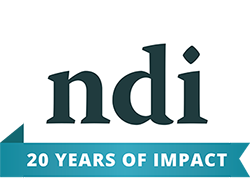
At the National Disability Institute (NDI), our mission is to build a better financial future for people with disabilities and their families through research, financial inclusion, economic development, and public policy advocacy.
We’re proud to partner with the American Council of Life Insurers (ACLI), an organization that shares our commitment to ensuring all Americans—regardless of work status or household income—can access financial protection products that support long-term stability.
Last year, ACLI launched the Financial Resilience Index, a quarterly report that examines middle-class families’ ability to handle financial challenges and plan for a stable future, and how those experiences differ for households that include a person with a disability. The report includes survey data highlighting how perceptions of financial security differ between households with and without a person with a disability—a crucial step toward understanding the unique pressures faced by the disability community within the middle class.
Question 1: Concern About Financial Decline
Survey Period: July 2024
In July 2024, 80% of middle-class households with a person with a disability (disability-present households) reported some level of concern about a serious decline in their financial situation over the coming months—11 percentage points higher than the share of all middle-class households. This elevated concern points to persistent vulnerability among families managing disability-related financial challenges.
Question 2: Affording Essentials and Core Costs
Survey Period: October 2024 and October 2025
In October 2024, 46% of middle-class disability-present households were concerned about affording daily essentials such as groceries and electricity, compared to 38% of all middle-class households. 38% of disability-present households were concerned about health care costs and 30% were concerned about housing.
When ACLI asked about this again October 2025, middle-class disability-present households remained slightly more concerned about affording daily essentials (62%) and healthcare (46%) than all other middle-class households (45% and 39%, respectively).
To help address these pressures, NDI’s Financial Resilience Center offers tools, guides, and resources designed to help individuals and families with disabilities make informed decisions about healthcare, credit, taxes, and essential living costs.
Question 3: Ability to Handle an Unexpected Expense
Survey Period: January 2025
When asked how confident they were in their ability to pay for and bounce back from an unexpected $5,000 expense—such as a home repair or medical procedure—66% of middle-class households with a person with a disability expressed at least some confidence in bouncing back financially. That compares to 77% of all other middle-class households, an 11-point gap that underscores the need for targeted financial tools and education.
NDI’s ABLE National Resource Center helps address this gap by promoting the use of ABLE accounts—tax-advantaged savings vehicles for people with disabilities. These accounts allow individuals to save for qualified expenses like housing, education, or healthcare without risking eligibility for essential public benefits such as SSI or Medicaid.
Looking Ahead
Overall, ACLI’s Financial Resilience Index indicates that middle-class financial resilience has remained stronger than average over the past year. Yet the accompanying Financial Resilience Survey data reveal that households including a person with a disability continue to face lower levels of financial resilience and greater concern about covering everyday expenses.
ACLI’s research and NDI’s partnership represent an important step toward identifying where middle-class Americans feel most financially vulnerable. Together, we hope to continue building bridges between the life insurance industry, policymakers, and disability advocates—working toward a stronger, more inclusive financial future for all.



